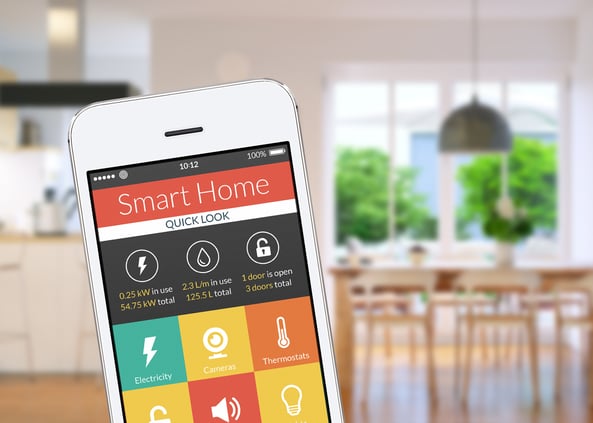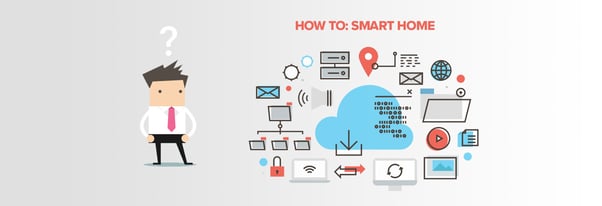
Are you looking to start a smart home business? And to do so with a proven business strategy?
Look no further! 2018 is setting up to be an excellent year to start your smart home automation business. This emerging home automation business opportunity is expected to grow from 32 Billion in 2015 to over 78 Billion by 2022. Think of it not just as an alignment of the stars, but more of a tsunami of the necessary combination of ingredients such as reduced business regulations, lower business taxes, and greater access to small business funding. All of which is creating a positive economic environment for not only home automation but for local businesses in general.
Catch Up: Home Automation 2016 -2018
2016 through 2018 were the biggest years for DIY home automation technology. With a variety of products and platforms fighting to control the home and the systems within it, the excitement homeowners experienced from installing these little devices was contagious. Everyone and their brother ordered smart home assistants to manage music players, lighting, security cameras, thermostat controls, online shopping and more. As the convenience of smart home devices flourished and the simplification of mundane day-to-day tasks became easier and easier, naturally, the instinctive consumer demand for more complete home automation grew.
But, there was just one problem.

Homeowners quickly realized that the "simplicity" of DIY home automation wasn't all that simple. Property owners who were already using a single smart assistant wanted to control the entire home and automate everything from their "all-in-one" smart home device, and who could blame them? Homeowners had assimilated the knowledge of their home automation platform and now the familiarity of one-touch control was the standard for living at home. Proprietary technology made smart home scalability almost impossible for the average homeowner. Seamless control with one device became frustrating with incompatible technology. Then firmware and software updates left older devices vulnerable and homeowners in the dark, literally.
The DIY home automation craze has pushed the demand for local professional smart home automation installation businesses to step in and create a home environment that can ensure improved convenience, comfort, energy efficiency, security and integrated connectivity throughout all systems and devices.
With all this commotion in the smart home arena, it's very clear that the business opportunity is growing day by day. Every "Hey Google" to "Alexa" this and "Alexa" that. Now, with that being said, let's take a look at our quick 6 step guide for starting your own smart home automation business.
6 Steps On How To Start A Smart Home Automation Business
1 ) Start with a smart home franchise or as a sole-proprietor
New entrepreneurs have many important decisions to make, but one of the biggest is whether to start a business of their own creation as a sole proprietor or to own a franchise. As a sole proprietor, the business owner has the ability to call his or her own shots and is not restricted by the need to follow the franchisor's operating procedures. However, a franchise offers many advantages over a typical sole proprietorship.
A CARBON RECALL franchise integrates smart home services with clean, renewable energy services. To learn more about this first of its kind franchise - click here
2 ) Identify Leading Smart Home Platforms
It’s clear that the race for the best “smart home” platform and the race for best “smart assistant” is in sprint mode, as is evident by a simple search for the best home automation products delivering results across the board. More importantly, at this time a standard across all platforms does not exist, and 90% of the smart device's data in homes goes uncaptured.
Check out the following articles:
- December 2016 PC Magazine article, The Best Smart Home Devices 2017
- C/NET December 2016 article, The Best Smart Home Devices
- The Battle Continues, Amazon Echo vs. Google Home
6 Leading Platforms
- Amazon with Echo and Alexa "skills"
- Apple with HomeKit and Siri
- Google with Home, Nest, and Google Assistant
- IBM with Watson and Cognitive Voice Driven Assistance
- Microsoft with Continuum and Cortana
- Samsung Smart Things + Leviton
3 ) Smart Home Business Model - Leaning In With Your Chosen Platform
By 2022, the typical home will have 500 smart devices, so leaning in with one of the leading smart home automation platforms with smart personal assistants makes sense.
Setting up your smart home business model. First, work to connect all the necessary support components:
- The wiring and piping – your electrical contractor and handyman
- The system – your audio, video, wi-fi and home security contractor
- The physical equipment and system devices – approved suppliers
- The smart home system integration component – pick a leader and ensure your contractors are well versed, trained and certified to support your decision.
4 ) Running Your Business as a Managing Operator or as an Operator
The strategy of working in your business or on your business is an important decision for an entrepreneur to make early on when considering launching a business. The distinction between working on your business and working in your business is the equivalent of working as a managing operator or working as a business operator. As an operator, you're doing the work yourself, and a managing operator your are managing the team that does the work.
When establishing a home automation business, the Operator status requires that you seek out the necessary certifications and professional licenses to perform the required services for your clients. The Managing Operator on the other hand, simply requires that you contract with a professional who will complete the home automation project for your clients on your behalf. Both the Operator or the Managing Operator are easier to set up when your business is aligned with a franchise system because the respective Approved Suppliers will happily provide the necessary training and education for you or for your contracted professional.
5 ) Getting Your Smart Home Business Started as a Franchise
One of the key benefits of organizing your business as a franchise is that the assembly of your business will incorporate all the necessary components of an effectively organized business. It’s easy to think “I’ll just hang my shingle” and you’re up and running, but when you start your business as a franchise, you have the benefit of a proven system which includes a roadmap for ensuring that your business is organized properly, including; place of business, brand and branding, CRM customer data systems, legal, insurance, licensing, accounting and finance, sales and marketing, customer acquisition, customer follow-up systems, all IT related issues, and more.
6 ) Organize Your Marketing Activities
Leverage the power of current, innovative marketing initiatives and the benefits of consistent brand strategies. Past franchise advertising and marketing approaches required phone book ads and other space-limiting promotions. Now, with modern marketing strategies businesses can utilize the unlimited space of the internet and its budget-friendly world of opportunities for local content marketing efforts.
When acquiring a franchise, you gain access to integral lead generation assets, social media platforms, personalized content creation, your own local SEO-ready website and more. All ready to help support the launch of your smart home automation business.
Start Your Home Automation Business with a CARBON RECALL® FRANCHISE
CARBON RECALL® is a business you can be proud of for the rest of your life while doing something you can be passionate about. Whether from home or work, our unique FastTrack strategy can get you growing your successful smart home automation business quickly and easily.
When you become a CARBON RECALL® franchise owner, you’ll get full turnkey training and support from a team with over 30 years’ experience in franchising.
.jpg?width=3725&height=1647&name=3D%20CR%20bevel%20RGB%20(2).jpg)



